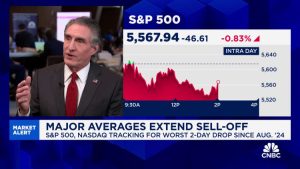Despite a stellar start to 2025 for the FTSE 100 as a whole, some members of the index are having a nasty time of it. Today, I’m looking at two examples and asking whether they actually represent wonderful bargains buys.
Trump’s tariff torment
Drinks firm Diageo‘s (LSE: DGE) woes aren’t a secret. Falling sales in the wake of higher prices, lower consumption of alcohol among younger generations and the growing popularity of weight-loss drugs have collectively given management a severe hangover. As I type, the share price sits barely above a 52-week low.
Last week, medium-term sales targets were pulled due to uncertainty over possible tariffs imposed on Mexico and Canada by President Trump. Since then, the latter has agreed to press the ‘pause’ button until March. Quite whether they ever kick in is up for debate. If they do, profit at the owner of brands such as Johnnie Walker whisky and Tanqueray gin could be severely hit.
It’s not all bad
On a more optimistic note, sales of Guinness have been growing nicely. It might also be argued that £50bn cap firm’s global reach makes it a less risky pick than other top-tier stocks dependent on just one or two regions. The current price-to-earnings (P/E) ratio of 17 is far below the average over the last five years (23) too. This suggests Diageo shares might be cheap.
So far, however, the markets seems unconvinced that CEO Debra Crew can turn things around quickly. And until there’s clarification over those tariffs, the shares might continue falling.
An unmissable opportunity? As much as I still like this company and its bursting portfolio of brands, I’m not quite as convinced as I once was that it represents a great opportunity for new investors just yet.
This strikes me as one to consider only when chinks of light begin to appear.
Lower growth
Another FTSE 100 stock that’s suffering is Primark owner Associated British Foods (LSE: ABF). Its shares haven’t really stopped falling since the end of May 2024.
A poorly-received update in late January has only compounded investors’ pain. Disappointing trading over Q1 — including the all-important festive period — has pushed the company to cut its outlook on sales at the high street retailer. “Low-single-digit” growth is now expected in FY25.
News of higher theft and violence at retailers across the UK is unlikely to be helping matters. Oh, and there’s the small matter of the firm needing to pay higher National Insurance Contributions from April. It’s already expected that this will cost ABF “tens of millions of pounds“.
Don’t bet the house
Given all this, it’s perhaps not surprising to learn that the shares now change hands of a forecast P/E of just 10. That’s almost half its five-year average P/E of 18. It’s also tempting given that Primark is only one of several businesses owned by the company. At 3.7%, the dividend yield is decent if not spectacular and looks set to be comfortably covered by profit.
The big question is whether shoppers will become even more cautious in the months ahead if inflation bounces higher than expected.
With this in mind, Fools may only want to consider dipping their toes in for now.
This post was originally published on Motley Fool






